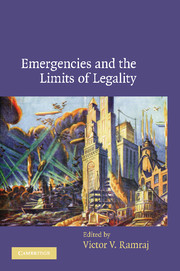Book contents
- Frontmatter
- Contents
- List of contributors
- Preface
- Introduction
- PART ONE Legality and extra-legality
- PART TWO Conceptual and normative theories
- 4 Emergency Logic: prudence, morality and the rule of law
- 5 Indefinite detention: rule by law or rule of law?
- PART THREE Political and sociological theories
- PART FOUR Prospective constraints on state power
- PART FIVE Judicial responses to official disobedience
- PART SIX Post-colonial and international perspectives
- Index
- References
4 - Emergency Logic: prudence, morality and the rule of law
Published online by Cambridge University Press: 10 August 2009
- Frontmatter
- Contents
- List of contributors
- Preface
- Introduction
- PART ONE Legality and extra-legality
- PART TWO Conceptual and normative theories
- 4 Emergency Logic: prudence, morality and the rule of law
- 5 Indefinite detention: rule by law or rule of law?
- PART THREE Political and sociological theories
- PART FOUR Prospective constraints on state power
- PART FIVE Judicial responses to official disobedience
- PART SIX Post-colonial and international perspectives
- Index
- References
Summary
Whether executive action contrary to law in an emergency can be justified depends not only on contingent circumstances – the credibility of an alleged danger, its gravity, its imminence – but on our understanding of law. It matters whether we understand law in prudential terms as instrumental to achieving desired goals or morally as prescribing goal-independent limits on the pursuit of goals. The word ‘moral’ in this context signals a non-instrumental relationship in which human beings treat one another not as obstacles to be overcome or resources to be used, but as persons whose autonomy should be respected. If law is instrumental, it can serve to oppress and exploit. Only if we think of law as ultimately moral in the sense defined do we approach a concept of legality that is distinct from arbitrary rule.
The premise of this chapter is that the prudential and the moral are distinct kinds of relationship, and that the arguments defining each belong to different universes of discourse. Emergency arguments work differently in each realm. Where law is understood in prudential terms as an instrument of policy, defending extra-legal acts does not change the kind of argument that is being made – we remain within the realm of prudential reasoning. To reason prudentially is to consider alternative outcomes and to weigh benefits and costs. Prudential reasoning is not necessarily self-interested because one can act prudently for others as well as for oneself.
- Type
- Chapter
- Information
- Emergencies and the Limits of Legality , pp. 97 - 117Publisher: Cambridge University PressPrint publication year: 2008
References
- 4
- Cited by



